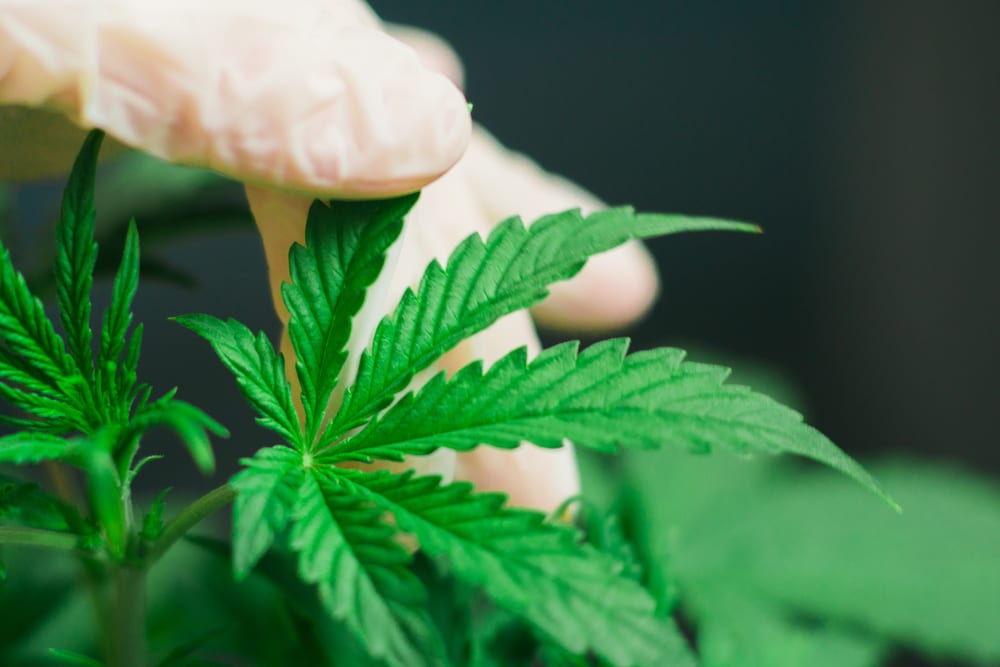Cannabis News
How to Use CBD for Your Dog’s Anxiety
Published
2 years agoon
By
admin

These days, everyone has heard of CBD, and the statistics are striking: 26% of American adults are using CBD in 2022, meaning that a major percentage of our population is using the substance to help them deal with a variety of issues. Many individuals have found that CBD has helped them in various ways, including helping to reduce anxiety, improving pain, and improving sleep. However, CBD has also proven to be popular for more than humans, and some research indicates that CBD may be helpful for dogs. Just like humans, some have found that CBD can be helpful in reducing their dog’s anxiety.
This begs the question: How can you use CBD for your dog’s anxiety? There are a few things to keep in mind when considering giving your dog CBD – let’s take a look at some of your options.
What The Research Says
As noted by dog experts – like those at the American Kennel Club – research is still limited on what CBD can do for dogs. However, a limited amount of studies – as well as the anecdotal experiences of many dog owners – have found that CBD can help certain pets recover from a variety of ailments. Owners have found that giving their dogs CBD can reduce anxiety, particularly when they are entering a stressful situation, like being alone or when there is a storm.
To be clear, this experience is anecdotal only, and more research is needed before veterinary medical authorities can come to more definitive conclusions. Furthermore, negative side effects – like changes in liver enzymes and an upset stomach – are possible for dogs who take CBD. However, as the AKC notes, the limited amount of studies conducted have indicated CBD’s potential to help dogs with symptoms of arthritis, itchiness, cancer, seizures, and anxiety. As such, there is some evidence to support the idea that CBD can help dogs.
Speak With Your Vet
Of critical importance is this: You should speak with your veterinarian before giving your dog any supplement, and this is unquestionably the case when it comes to CBD. This is the case for many reasons. Chief among them: CBD is still relatively new to dogs. As such, it behooves you to check and make sure that no new research has come out that may present any concerns about how a dog will react to CBD.
Furthermore, since the research is constantly evolving on how CBD impacts dogs, your veterinarian may have some recommendations about types of CBD and dosages to give your beloved pet.
Start Low and Slow
Finding the right instructions for how to use CBD for your dog can be difficult and complicated. Since the area is so new, you may have multiple questions about the right way to use CBD for your pet. Chief among them: How strong a dosage should you give your pet? How often should you give it to them?
The answer to this very important question should come from two sources: Your veterinarian and the CBD product you actually buy. Follow your vet’s advice above all else. If your vet isn’t sure and notes that it depends on the specific product you can use, your best bet is to start low and slow, just like you would for a human. Pay attention to the instructions of the CBD that you buy and use the lowest possible dosage. Doing so will ensure that you can avoid any potentially problematic side effects. Give the lowest possible dose for a week or so, and monitor your dog for changes in its behavior. If you are not noticing any problematic side effects, slowly increase the dosage until you find your dog is responding.
The one thing you may want to consider is your dog’s size. Larger dogs – just like larger humans – may need a bigger dosage in order to have any impact. You should still err on the side of giving a lower amount, but if you have a larger dog, you may need to give more. Many CBD products will have different dosage requirements depending on the size of the dog, and this makes sense.
Buy Pet-Formulated CBD
There are many types of CBD on the market. However, just like with regular food and supplements, there are key differences in terms of the type of CBD available for humans and the type of CBD available for dogs. You should only purchase CBD for your pets that have been specifically designed for them. Doing so ensures that you are giving your dog a product that it will be able to digest and absorb easily. If the product is designed well, it also ensures that it will avoid any potentially harmful additives that might be more tolerable in humans.
Check The Certificate
Every package of CBD – regardless of if it is made for humans or animals – must come with a Certificate of Authenticity for you to consider buying it. A Certificate of Authenticity is a test that is conducted by a third party. The information on it will reveal the testing results for the particular batch of CBD you are buying. This test will reveal the content of the CBD and its purity. It will also confirm that there are other dangerous contaminants in the CBD.
Unfortunately, this certificate is absolutely critical. Multiple studies have confirmed that some unscrupulous CBD vendors do not accurately label their CBD products. A Certificate of Authenticity can help to ameliorate these concerns by ensuring that a third-party tests the CBD. This should allow you to purchase CBD with safety in mind.
Buy From a Reputable Company
Not all CBD companies are created equal. Look for a proven brand such as Eden’s Herbals. They carry specialty made CBD for dogs. Their products come in both tinctures or treats, giving you the flexibility to ensure that you give your dog a CBD product that works best for you. These products also come with clear instructions on how to best use each product.
CBD FOR OLDER DOGS, READ ON…
You may like
Cannabis News
Pot for Potholes? – Michigan Plans to Let Cannabis Tax Revenue Fix the Growing Pothole Problem in the State
Published
8 hours agoon
February 25, 2025By
admin

In recent months, Michigan has found itself at the intersection of two significant issues: the deteriorating state of its roads and the burgeoning cannabis industry. Governor Gretchen Whitmer’s ambitious plan to allocate funds from marijuana taxes to repair potholes has ignited a lively debate within both the political and cannabis communities. As the state grapples with aging infrastructure, the proposal raises questions about funding priorities, industry sustainability, and consumer impact. This article delves into the details of the plan, its implications for Michigan’s cannabis sector, and the broader conversation it has sparked.
The State of Michigan’s Roads
Michigan is notorious for its rough roads. According to a report from the American Society of Civil Engineers, nearly 40% of Michigan’s roads are in poor condition, leading to increased vehicle damage and safety concerns for drivers. The state has long struggled with funding for road repairs, often relying on gas taxes and federal funds that have proven insufficient to address the growing backlog of maintenance needs.
The Economic Impact of Poor Infrastructure
The economic ramifications of poor road conditions are profound. Businesses face higher transportation costs due to vehicle wear and tear, while residents experience longer commute times and reduced quality of life. Additionally, inadequate infrastructure can deter new businesses from setting up shop in Michigan, further stifling economic growth.
Governor Whitmer’s Proposal
In response to these pressing issues, Governor Whitmer announced a comprehensive $3 billion plan aimed at revitalizing Michigan’s roads. The proposal focuses on innovative funding strategies, including a significant increase in taxes on marijuana products.
Funding Breakdown
The proposed funding plan includes:
-
$1.7 billion from corporate taxes and technology companies.
-
$1.2 billion from increased gas taxes.
-
$500 million cut from unspecified spending areas.
-
A 32% wholesale tax on marijuana products projected to generate $470 million annually.
This ambitious approach aims not only to repair potholes but also to create a more sustainable funding model for ongoing infrastructure needs.
The Role of Cannabis Tax Revenue
Michigan legalized recreational marijuana in 2018, leading to a rapid expansion of the cannabis market. With over 400 licensed dispensaries and a thriving cultivation sector, tax revenue from cannabis sales has become a significant source of income for the state. Currently, marijuana products are subject to a 10% excise tax and a 6% sales tax; however, Governor Whitmer’s proposal seeks to elevate this wholesale tax substantially.
Reactions from the Cannabis Community
The announcement has elicited mixed reactions from various stakeholders within Michigan’s cannabis community. While some applaud the idea of using cannabis tax revenue for public goods like road repairs, others express concern about the potential negative consequences for the industry.
Support for the Initiative
Many proponents argue that using cannabis tax revenue for infrastructure improvements is a logical step forward. They contend that as one of the most lucrative sectors in Michigan’s economy, the cannabis industry should contribute significantly to public services.
-
Public Good Argument: Advocates argue that better roads benefit everyone, including those in the cannabis industry who rely on transportation for distribution and customer access.
-
Community Investment: Some believe that investing in infrastructure will enhance overall community well-being and support local businesses.
Concerns About Increased Taxes
On the other hand, several dispensary owners and industry advocates express serious concerns about the proposed tax increase:
-
Impact on Consumers: Many fear that raising taxes on marijuana products will lead to higher prices for consumers. One dispensary owner noted that some products could see price increases close to 90%, making legal cannabis less competitive against black market alternatives.
-
Market Viability: There is apprehension that higher prices could drive consumers back into the black market, undermining years of progress made in legalizing and regulating cannabis sales.
-
Small Business Struggles: Smaller dispensaries may struggle more than larger corporations to absorb increased costs, potentially leading to business closures and reduced competition in the market.
Broader Economic Implications
The intersection of road funding and cannabis taxation raises broader questions about economic policy in Michigan. As states across the U.S. grapple with similar challenges—balancing public needs with industry growth—Michigan’s approach may serve as a case study for others.
Balancing Act: Public Needs vs. Industry Growth
Governments must find ways to fund essential services while fostering economic growth in emerging industries like cannabis. The challenge lies in ensuring that taxation does not stifle innovation or drive consumers away from legal markets.
Potential Alternatives
Some industry representatives have called for alternative funding solutions that do not rely solely on increased taxation:
-
Reallocation of Existing Funds: Advocates suggest examining current budget allocations to identify areas where funds can be redirected toward road repairs without imposing new taxes.
-
Public-Private Partnerships: Collaborations between government entities and private companies could provide innovative solutions for funding infrastructure projects without burdening taxpayers or industries.
-
Incentives for Local Businesses: Offering incentives or tax breaks for local businesses involved in road repair projects could stimulate job creation while addressing infrastructure needs.
Political Landscape
Governor Whitmer’s proposal has also ignited discussions within Michigan’s political landscape. Republican lawmakers have voiced opposition to increasing taxes on marijuana products as part of road funding strategies.
Republican Counterproposal
In response to Whitmer’s plan, Republican lawmakers have proposed an alternative $3 billion road funding strategy that does not rely on tax increases. This plan emphasizes reallocating existing funds rather than imposing new taxes on any industry.
Bipartisan Cooperation Challenges
While both parties agree on the need for better roads, finding common ground on how to fund these improvements remains elusive. The debate over using marijuana tax revenue highlights broader ideological differences regarding taxation and government spending priorities.
The Future of Cannabis Regulation in Michigan
As discussions around Governor Whitmer’s proposal continue, they underscore broader trends in cannabis regulation across the United States. States that have legalized marijuana are increasingly looking at how best to leverage tax revenue generated from this burgeoning industry.
Lessons Learned from Other States
States like Colorado and California have faced similar challenges regarding how best to utilize cannabis tax revenue. In Colorado, funds have been allocated toward education initiatives and public health programs; however, debates continue over how effectively these funds are being utilized.
Ensuring Transparency and Accountability
For Michigan’s approach to be successful, it will be essential to establish transparency and accountability measures regarding how cannabis tax revenues are spent. Ensuring that funds are directed toward meaningful infrastructure improvements will be critical in maintaining public support for both road repairs and continued investment in the cannabis industry.
Conclusion
Governor Gretchen Whitmer’s plan to fix potholes using marijuana tax revenue has sparked an important conversation about infrastructure funding and its relationship with emerging industries like cannabis. While many see this as an innovative solution to longstanding issues with road conditions in Michigan, others raise valid concerns about potential negative impacts on consumers and small businesses within the cannabis sector.
As discussions evolve, it will be crucial for stakeholders from government officials to industry representatives to engage collaboratively in seeking solutions that benefit both public infrastructure needs and economic growth within the cannabis community. The outcome of this debate may not only shape Michigan’s future but also serve as a model for other states navigating similar challenges as they balance public service needs with burgeoning industries’ growth potential.
MICHIGAN GOES CANNABIS GREEN, READ ON…


People in the cannabis market are now focusing on several different cannabis compounds to develop new marijuana-based products. THCA is a well-known compound that people now embrace. People receive different benefits from using the chemical compound Tetrahydrocannabinolic acid THCA. This article will outline the benefits and uses of THCA Flower.
What is THCA Flower?
THCA flower is raw cannabis with high levels of THCA. The product does not present psychoactive effective can be consumed raw. However, when it is exposed to heat it can present some side effects since it converts to THC. The idea shows that smoking it can present some THC effects. A lot of people look for thca flower clearance deals to experience its benefits without spending more money. Raw cannabis products like THCA flower are widely known due to its different uses.

Benefits of THCA Flower
- Anti-Inflammatory Properties
THCA is widely used for its ability in reducing inflammation. Therefore, if you often suffering from inflammatory conditions, then including THCA in your routine can boost your health outcomes. This can reduce the risks you are exposed to.
Several studies show that THCA interacts with the body’s endocannabinoid system which regulates several physiological processes. This makes it a natural option for managing conditions like arthritis and muscle soreness.
THCA have neuroprotective properties, making it an ideal option for people that want to seek support brain health. The idea shows that THCA can help you manage neurodegenerative conditions like Alzheimer.
Including THCA flower in your routine can help promote long-term cognitive wellness, helping you stay focused. For this reason, if you need to explore its benefits and affordability, then THCA Flower Clearance is an ideal choice for you.
Uses of THCA Flower
You can enjoy THCA flower by consuming it raw. You can also choose to add it in smoothies, juices, or salad for a nutrient-packed addition to your diet. Consuming the product raw help preserves its compound, allowing you to enjoy the required benefits without incurring any psychoactive implications.
If you are a wellness enthusiast, then this product is the best option to include in your daily life. Its naturalness complements different recipes, which can be beneficial, especially if you love herbal meals.
Furthermore, THCA flows can be used to make homemade tropical products like cream or salved. These products are used to soothe pain and inflammation when applied directly.
Experimenting different preparations can help you create a customized solution that addresses your specific needs. Combining THCA with natural ingredients like coconut oil or essential oils can increase the soothing effect.
Therefore, a THCA flower is a popular product in the cannabis industry due to its increased benefits and uses. It contains anti-inflammatory and neuroprotective properties, which present potential health benefits for people with different needs. Examining these products through THCA Flower Clearance options can offer you ideal insights into its advantages without breaking the banks. If you are new to cannabis, then thca flower clearance can be the best option to choose.
Cannabis News
280E Tax Code Restrictions on Cannabis Companies Forever?- GOP Senators File Bill to Keep 280E No Matter What Happnes to Weed
Published
3 days agoon
February 22, 2025By
admin

In a move that has sparked significant controversy within the cannabis industry and among reform advocates, Republican Senators James Lankford (Oklahoma) and Pete Ricketts (Nebraska) have introduced a bill that seeks to permanently enforce the tax penalties imposed on cannabis businesses under Section 280E of the Internal Revenue Code. The legislation, titled the “No Deductions for Marijuana Businesses Act,” was filed on February 7, 2025, and aims to ensure that marijuana operators remain unable to deduct standard business expenses, even if marijuana is rescheduled under federal law.
The proposal comes at a time when cannabis reform advocates have been pushing for fairer tax policies and greater federal recognition of the legal cannabis industry. However, this bill represents a significant obstacle to those efforts, as it would effectively maintain one of the most burdensome financial restrictions on cannabis businesses indefinitely. This article explores the implications of the proposed legislation, its potential impact on the cannabis industry, and the broader context of federal marijuana policy reform.
What Is Section 280E?
Section 280E of the Internal Revenue Code is a decades-old provision that has long been a thorn in the side of legal cannabis operators. Enacted in 1982 during the height of the War on Drugs, Section 280E prevents businesses involved in trafficking Schedule I or II controlled substances from deducting ordinary and necessary business expenses from their taxable income. This includes expenses such as rent, payroll, utilities, advertising, and other operational costs.
The provision was originally designed to target illegal drug dealers but has since been applied to state-legal cannabis businesses due to marijuana’s classification as a Schedule I drug under the Controlled Substances Act (CSA). As a result, cannabis operators are subject to significantly higher effective tax rates compared to businesses in other industries. In some cases, these tax rates can reach as high as 70% to 90%, leaving many cannabis companies struggling to stay afloat despite generating substantial revenue.
For years, cannabis advocates have argued that Section 280E is outdated and unfairly penalizes businesses that operate legally under state laws. They contend that removing or modifying this provision would allow cannabis companies to reinvest in their operations, create jobs, and contribute more effectively to local economies.
The “No Deductions for Marijuana Businesses Act”
The bill introduced by Senators Lankford and Ricketts seeks to cement Section 280E’s application to cannabis businesses permanently. Specifically, it would ensure that even if marijuana is rescheduled from its current classification as a Schedule I drug—something reform advocates have been pushing for—cannabis operators would still be barred from deducting standard business expenses.
In a statement accompanying the bill’s introduction, Senator Lankford said:
”Marijuana doesn’t make our families stronger, our streets safer, or our workplaces more productive. Businesses that sell federally illegal drugs—including marijuana businesses—shouldn’t get federal tax breaks.”
Senator Ricketts echoed this sentiment, emphasizing his opposition to what he described as efforts to “normalize” marijuana use:
”We cannot allow federal tax policy to subsidize an industry that poses serious risks to public health and safety.”
The bill reflects a broader ideological stance among certain Republican lawmakers who remain staunchly opposed to cannabis legalization at both the state and federal levels. By targeting one of the key financial incentives for rescheduling or descheduling marijuana—namely, relief from Section 280E’s tax penalties—the legislation seeks to undermine efforts to legitimize the industry.
Implications for Cannabis Businesses
If enacted, the “No Deductions for Marijuana Businesses Act” would deal a significant blow to cannabis operators already grappling with high taxes and regulatory challenges. Many in the industry were hopeful that rescheduling marijuana—such as moving it from Schedule I to Schedule III under the CSA—would alleviate some of these burdens by rendering Section 280E inapplicable. However, this bill would ensure that those hopes are dashed.
Financial Strain on Operators
The inability to deduct ordinary business expenses means that cannabis companies are taxed on their gross income rather than their net income. This creates an unsustainable financial model for many operators, particularly small and medium-sized businesses that lack access to traditional banking services or capital due to federal prohibition.
For example:
A dispensary with $1 million in revenue might incur $800,000 in operating expenses. Under normal tax rules, it would pay taxes on $200,000 in profit. However, because of Section 280E, it must pay taxes on the full $1 million in revenue. With effective tax rates often exceeding 70%, this leaves little room for reinvestment or growth—and in some cases leads to insolvency.
By keeping these restrictions permanently intact, Lankford and Ricketts’ bill could exacerbate existing disparities within the industry. Larger multi-state operators (MSOs) with significant resources may be able to weather these challenges better than smaller independent businesses or social equity applicants seeking entry into the market.
Impact on State-Legal Markets
The financial strain imposed by Section 280E also has broader implications for state-legal cannabis markets. High taxes and operating costs make it difficult for legal businesses to compete with illicit operators who do not face similar financial constraints. This undermines one of the primary goals of legalization: reducing the size of the illegal market.
According to Beau Whitney, Chief Economist at Whitney Economics:
”Maintaining 280E restrictions will only perpetuate an uneven playing field where illicit operators thrive while legal businesses struggle.”
States that rely on tax revenue from legal cannabis sales could also feel the impact. If legal operators are forced out of business due to unsustainable tax policies, states could see declines in revenue earmarked for education, healthcare, infrastructure projects, and other public services funded by cannabis taxes.
Opposition From Advocates and Industry Leaders
The introduction of this bill has drawn sharp criticism from cannabis advocates and industry leaders who view it as a regressive step that ignores both economic realities and shifting public opinion on marijuana legalization.
Advocacy Groups Speak Out
Organizations such as the National Cannabis Industry Association (NCIA) and Marijuana Policy Project (MPP) have condemned Lankford and Ricketts’ proposal. In a statement released shortly after the bill’s introduction, NCIA Executive Director Aaron Smith said:
”This legislation represents an outdated approach rooted in stigma rather than science or common sense. It unfairly targets an industry that Is creating jobs, generating tax revenue, and providing safe access for millions of Americans.”
Similarly, MPP’s Deputy Director Matthew Schweich argued:
”Punitive tax policies like 280E only serve to bolster the illicit market while undermining legitimate businesses trying to operate within state laws.”
Industry Leaders React
Cannabis business owners have also voiced their concerns about how this legislation could impact their operations. Many argue that fair tax treatment is essential not only for their survival but also for fostering innovation and competition within the industry.
Kim Rivers, CEO of Trulieve Cannabis Corp., stated: ”The legal cannabis industry has proven its value time and again through job creation and community investment. Policies like this threaten all of that progress.”
Broader Context: Federal Rescheduling Efforts
The timing of this bill is particularly notable given ongoing discussions about rescheduling marijuana at the federal level. In late 2023, President Joe Biden directed federal agencies—including the Department of Health and Human Services (HHS) and Drug Enforcement Administration (DEA)—to review marijuana’s classification under the CSA. HHS subsequently recommended moving marijuana from Schedule I (the most restrictive category) to Schedule III.
Rescheduling marijuana would represent a significant shift in federal policy by acknowledging its medical value while reducing some regulatory barriers. However, it would not legalize marijuana outright or address issues like banking access or interstate commerce.
Advocates had hoped that rescheduling would also eliminate Section 280E’s application to cannabis businesses—a key incentive for reform efforts. By introducing legislation specifically designed to preserve these tax penalties regardless of rescheduling outcomes, Lankford and Ricketts are effectively preempting one of the potential benefits of reform.
Conclusion
The “No Deductions for Marijuana Businesses Act” introduced by Senators James Lankford and Pete Ricketts represents a significant challenge for advocates seeking fairer treatment for legal cannabis operators under federal law. By aiming to keep Section 280E’s tax penalties permanently intact—even if marijuana is rescheduled—the bill threatens to undermine progress toward legitimizing an industry that has already faced numerous obstacles. While proponents argue that such measures are necessary to prevent “subsidizing” an industry they oppose on moral grounds, critics contend that maintaining punitive tax policies will only harm legitimate businesses while empowering illicit markets.
As debates over federal marijuana policy continue—including discussions around rescheduling—it remains crucial for stakeholders within the cannabis industry to mobilize against regressive measures like this one. The future of America’s rapidly evolving relationship with cannabis hangs in the balance—and decisions made now will shape its trajectory for years to come.
MORE ON 280E, IT KILLS CANNABIS, READ ON…

Montanans must activate to protect legalization in 2025

Analysis: Don’t hold your breath for legalization under Trump 2.0

Pot for Potholes? – Michigan Plans to Let Cannabis Tax Revenue Fix the Growing Pothole Problem in the State

Karma Koala Podcast 232: Karina Bashir, Antithesis Law. Her work developing ESG & Corporate Practice Blueprint In The New Psychedelics Ecosystem

Medical cannabis registries show steep decline after launch of adult-use sales

Benefits and Uses of THCA Flower

The best weed-friendly travel spots of 2025

The Next Wave in Cannabis Retail: Smart Stores

Under the Humboldt Sun – GanjaVacations Jamaica

New Hampshire House Passes Cannabis Legalization Bill

Distressed Cannabis Business Takeaways – Canna Law Blog™

United States: Alex Malyshev And Melinda Fellner Discuss The Intersection Of Tax And Cannabis In New Video Series – Part VI: Licensing (Video)

What you Need to Know

Drug Testing for Marijuana – The Joint Blog

NCIA Write About Their Equity Scholarship Program

It has been a wild news week – here’s how CBD and weed can help you relax

Cannabis, alcohol firm SNDL loses CA$372.4 million in 2022

A new April 20 cannabis contest includes a $40,000 purse

Your Go-To Source for Cannabis Logos and Designs

UArizona launches online cannabis compliance online course
Trending
-

 Cannabis News2 years ago
Cannabis News2 years agoDistressed Cannabis Business Takeaways – Canna Law Blog™
-

 One-Hit Wonders2 years ago
One-Hit Wonders2 years agoUnited States: Alex Malyshev And Melinda Fellner Discuss The Intersection Of Tax And Cannabis In New Video Series – Part VI: Licensing (Video)
-

 Cannabis 1012 years ago
Cannabis 1012 years agoWhat you Need to Know
-

 drug testing1 year ago
drug testing1 year agoDrug Testing for Marijuana – The Joint Blog
-

 Education2 years ago
Education2 years agoNCIA Write About Their Equity Scholarship Program
-

 Cannabis2 years ago
Cannabis2 years agoIt has been a wild news week – here’s how CBD and weed can help you relax
-

 Marijuana Business Daily2 years ago
Marijuana Business Daily2 years agoCannabis, alcohol firm SNDL loses CA$372.4 million in 2022
-

 California2 years ago
California2 years agoA new April 20 cannabis contest includes a $40,000 purse






